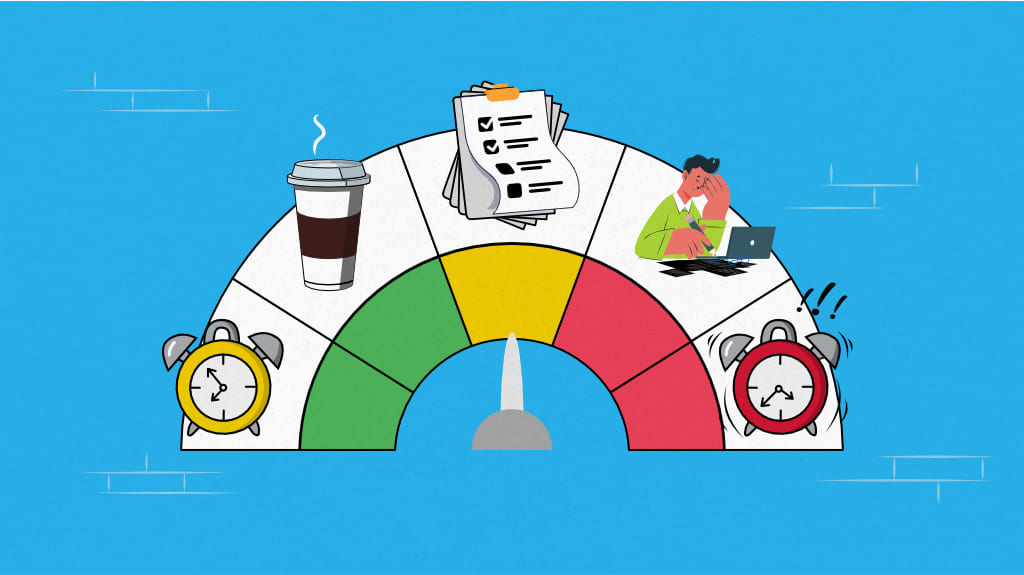“If you don’t take time to rest, your body’s going to pick a time for you that you won’t be able to work.” – Dr. Will Cole
Toxic productivity is the urge that does not let you settle. It tells you to be productive all the time. Maybe you’ve decided to kick back with your favorite show, but instead of feeling relaxed, you’re restless, questioning if watching TV is the best use of your time.
Welcome to the spiral of toxic productivity!
I vividly recall when I fell into this trap. My days were a blur of back-to-back tasks, a crammed schedule, and endless to-do lists. I wore my busyness like a badge of honor. Even when I should have been unwinding, strolling in the park, or flipping through a novel, I felt so uneasy, guilty even as though those simple pleasures were indulgences I couldn’t afford.
One evening, during what was supposed to be a family dinner, I found myself zoning out, thinking about all the emails I hadn’t answered. My child called out, “Are you even listening,” and that moment hit me the most. My mind was so occupied with ‘what’’s next’ that I wasn’t fully present for the people or moments that truly mattered. Can you relate?
Toxic productivity tricks you into believing that even small moments of relaxation are a waste of time because they don’t directly add value to your goals.
The scary part? You become so consumed with achieving your goals that you ignore the small, essential joys of life- like an evening walk where you simply admire the sunset or laugh so hard at a joke your belly hurts.
No matter how much you accomplish, toxic productivity whispers, ‘You could do more’. Over time, this mindset drains your energy, strains your relationships, and leaves you teetering on the brink of burnout.
I’ve learned this lesson the hard way, but it doesn’t have to be the same for you. I have curated this article to help you understand what toxic productivity is, what its causes are, the signs that tell you are struggling with it, and what you can do to break the cycle of it.
What is toxic productivity?
Toxic productivity is an unhealthy obsession to be productive all the time. It compels you to generate something productive from every activity you perform in a day, leaving no room for relaxation or activities done for enjoyment.
This mindset convinces you that every moment should contribute to your goals or success. If it doesn’t, it triggers feelings of guilt and inadequacy.
According to psychologist Dr. Devon Price, author of “Laziness Does Not Exist,” toxic productivity stems from societal pressures that glorify overworking as a measure of self-worth. This thinking creates a dangerous cycle where even rest feels like a failure.
Toxic productivity takes a toll on mental health and diminishes the quality of relationships and personal well-being, making it a silent yet harmful adversary in our quest for success.
Read more: Best productivity tools that will make your life much easier
What is the difference between toxic and healthy productivity
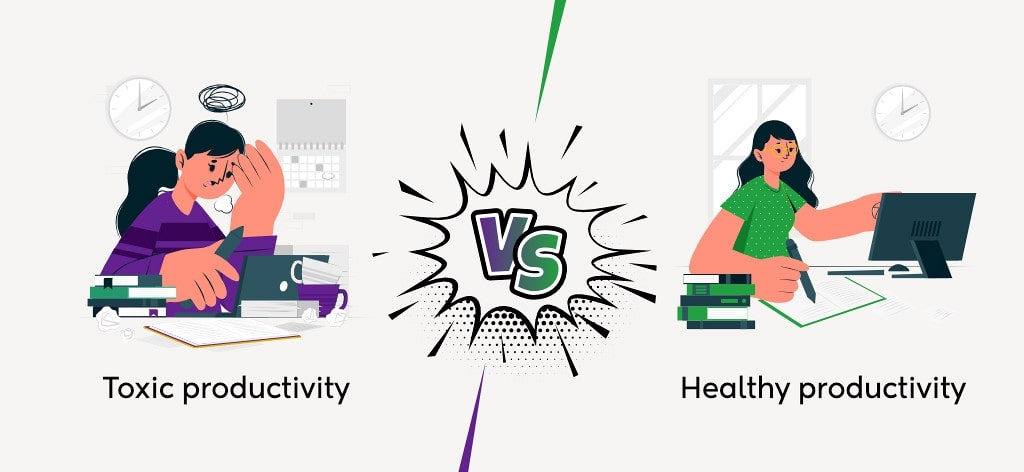
Imagine: your team is filled with vibrant energy. Ideas are exchanged freely, projects are moving forward, and there’s laughter in between the work. This is what healthy productivity looks like — a workplace where everyone feels motivated, valued, and balanced.
Now, picture the same team, but instead of laughter, there’s silence punctuated by sighs. People are glued to their screens, working late hours, skipping meals, and responding to emails at all hours. The spark is gone, replaced by overwhelming work stress. This is toxic productivity.
So, what sets the two apart?
Healthy productivity is all about balance. Employees are given the right tools, a supportive environment, and adequate attention to flourish. They work efficiently but also have time to recharge. Breaks are encouraged, achievements are celebrated, and everyone knows their well-being matters just as much as their output. In this framework, creativity prospers, collaboration grows, and your team members feel energized, not drained.
Toxic productivity, on the other hand, emphasizes the relentless pursuit of results, often at the expense of employees’ mental and physical health. Long hours, skipped breaks, and a culture of “always being on” create an environment where stress becomes the norm. Sure, the work gets done, but at what cost? Burnout, high turnover, and decline in creativity are the common signs of this unsustainable approach.
But, here is the good news. As a manager, you can create a healthy environment for your team. When your team feels supported and valued, they are more motivated, engaged, and productive, leading to the success of both the team and the organization.
So, what kind of workplace do you want to create? The choice is yours.
Examples of toxic productivity
Toxic productivity manifests in various industries, often making individuals compromise their health for the sake of performance.
This relentless urge for success results in serious negative consequences, such as exhaustion, addiction, and even Karoshi – a phenomenon meaning “death by overwork.”
Here are two examples that will help you understand the dangers of this mindset:
Example 1: Wall street bankers and stimulant abuse
A recent investigation found that many young bankers on Wall Street are using Adderall, a medication normally prescribed for ADHD, to help them manage the intense demands of their jobs.
They often work extremely long hours – sometimes up to 90 hours a week or more, with shifts lasting 20 to 22 hours. This stressful work environment has led to a troubling trend where some bankers are snorting crushed Adderall at their desks to stay focused and energized during these long days.
This heavy reliance on stimulants resulted in the death of investment banker Leo Lukenas III, who passed away after working long hours. His case highlights the serious risks of this high-pressure culture.
There are growing concerns about the long-term effects on both physical and mental health for those in these demanding roles, which suggests it’s time to rethink how things are done in these workplaces.
Example 2: Celebrity health issues amidst work pressure
Josh Widdicombe, a comedian known for shows like Mock the Week and Parenting Hell, recently talked about how overworking affected his mental health.
In 2022, his strong desire to succeed in his career led to severe anxiety, depression, and eventually a breakdown. He described this “collapse” as the result of burnout, brought on by the pressure to balance his busy job and family life.
Even when he was on vacation with his wife, Widdicombe found it hard to relax, often working on his stand-up material. After his second child was born, the stress became overwhelming. He expressed his struggle, saying he didn’t want to be an absent father but also didn’t want to neglect his career.
Widdicombe’s story highlights how societal pressures to excel in every aspect of life can lead to toxic productivity. His journey stresses the importance of setting boundaries and taking care of mental health instead of always striving for success.
How toxic productivity can affect the physical and mental health
Toxic productivity is a pressing issue where the relentless pursuit of efficiency and perfectionism takes a toll on both physical and mental health.
As a manager, you must understand how this phenomenon can impact your team members, leading to burnout and decreased overall performance.
Here are a few implications of toxic productivity on physical and mental health:
- Chronic fatigue: If your team members constantly strive for productivity, they can easily get exhausted, making it hard for them to focus and perform well.
- Sleep disorders: The stress of meeting high expectations often results in insomnia or poor sleep quality, which further drains energy levels.
- Neglect of self-care: A strong focus on work may cause employees to skip meals, avoid exercise, and overlook necessary health check-ups, which can have long-term health consequences.
- Burnout: The pressure to always deliver quality products on time can cause emotional and physical exhaustion, reducing job satisfaction and productivity.
- Increased anxiety and depression: Did you know that nearly one billion people suffer from either anxiety or depression worldwide? The constant need to be productive can foster feelings of inadequacy and overwhelm, contributing to mental health issues.
- Loss of motivation: Ironically, pushing too hard can result in decreased motivation over time, creating a cycle of low performance.
What are the causes of toxic productivity?
Psychologist Kathryn Esquer, founder of the Teletherapist Network, says, “We could have used our free time to rest, recharge, and restore ourselves, but many of us filled those hours with more work as a way to feel worthy, fulfilled, and in control.”
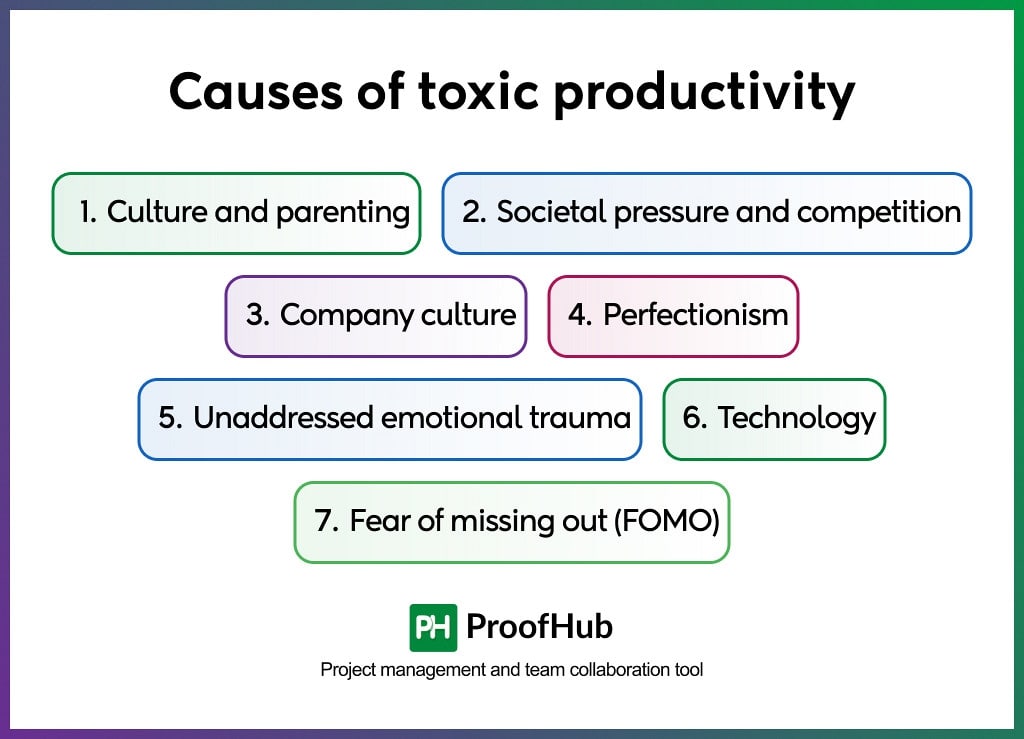
Toxic productivity on the surface may seem like the simple greed to achieve more, but in the deep, it is the result of the amalgamation of various things.
Have a look at the three primary causes of it.
1. Culture and parenting
The root cause of toxic productivity lies in culture and parenting.
In a discussion with Greyjournal, Dr. Barren said, “In American culture, we do not value the person. We value productivity, wealth, achievement, doing and being more.”
Knowingly or unknowingly, parents pressure their kids to perform highly right from childhood. Thus, it is common for young adults to attach their self-worth to outside outcomes. This leads to toxic productivity.
2. Societal pressure and competition
In this hustle culture, where everyone is talking about working hard, one feels the pressure to work for long hours to become successful. If you do not, it makes you feel guilty for not giving your best. It is because some successful people back this type of pressure.
The world’s richest person Elon Musk says, “Nobody ever changed the world in 40 hours a week.”
N.R. Narayana Murthy, an Indian billionaire businessman and co-founder of Infosys, recently said, “Young Indians should work 70 hours a week.”
When you hear all this, this leads to the firm belief that if you want to be successful, you need to maximize productivity. Otherwise, you will be left far behind.
3. Company culture
Sometimes, it is not the parenting, it is not the societal pressure, it is just your company work culture that rewards toxic productivity. In such places, the management glorifies working for long hours. Thus, you are compelled to work long hours to prove your worth or for promotion. This becomes toxic.
Apart from that, the pursuit of perfectionism, living in a competitive society, and escape from unaddressed emotional trauma can also contribute to it.
Read more: How to create a happy work culture
4. Perfectionism
“Perfection is the enemy of progress.” — Winston Churchill, former Prime Minister of the United Kingdom
The relentless pursuit of perfection can be another reason for toxic productivity. People who aim for flawless results in everything often push themselves beyond healthy limits.
This “all or nothing” mindset leaves little room for mistakes or balance, feeding into toxic productivity cycles.
5. Unaddressed emotional trauma
For some, toxic productivity serves as a coping mechanism to escape unresolved emotional issues.
They try to stay constantly busy to avoid confronting difficult feelings or past experiences, inadvertently leading to burnout.
6. Technology and accessibility
The rise of technology, in recent times, has blurred the boundaries between work and personal life. With smartphones and laptops, employees are expected or feel obligated to stay connected and respond at all hours.
This lack of separation from work perpetuates an “always on” mindset, fueling toxic productivity.
7. Fear of missing out (FOMO)
“So often people are working hard at the wrong thing. Working on the right thing is probably more important than working hard.” – Caterina Fake, American entrepreneur and businesswoman.
The fear of being left behind often pushes individuals to overwork themselves. In a world where success stories and achievements are constantly highlighted on social media, people don’t want to be overlooked.
They feel they need to work harder to keep up with their peers or maintain their image. This relentless comparison leads to unhealthy work habits and burnout.
5 Signs of toxic productivity
The irony of toxic productivity is most people who are suffering from it do not even know that they are. So, it is important to know the signs of it.
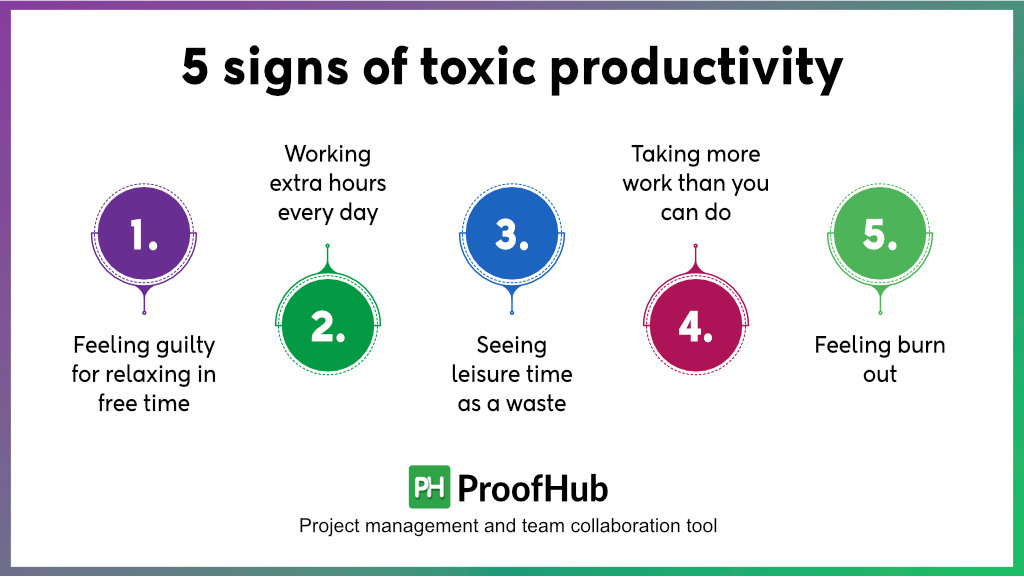
1. Feeling guilty for relaxing in free time
If you are not able to relax in your free time or you feel guilty for doing nothing in your free time, it is a sign that you are suffering from toxic productivity. Instead of enjoying your free time, you would rather think that I should do something important in my free time.
2. Working extra hours every day
If logging extra hours and working on the weekends has become a norm for you, it is a sign of toxic productivity. You are not doing it because it is needed once in a while. You are doing it every day by choice. And you have made a habit of using your downtime for work.
3. Seeing leisure time as a waste
If you see spending time with family and friends, things you enjoy doing, and self-care as a waste of time, it is a sign you are suffering from toxic productivity. It is because you want to spend time only on the things that contribute to your achievements.
4. Taking more work than you can do
If you are someone who takes up more projects than you can handle regularly, you are likely suffering from toxic productivity. It is because you do not want to be free as it is not worthy. So, you want to keep yourself busy with more work.
5. Feeling burn out
If you are feeling frequent burnout, it is a sign of toxic productivity. This happens because you are pushing yourself too hard without taking a rest and are not able to detach yourself from work.
And the worst thing about toxic productivity is it seeps into other areas of life. You try to be productive in your personal life too.
If continued for the long run, at one point, your mind and body will not be able to bear it. This can lead to dire mental and physical health problems.
But the good thing is you are now aware of it and you can work to fix it.
Do you know that you can achieve more at the workplace with effective time management? Check out the top 10 tips to plan your day for maximum productivity!
7 tips to break the cycle of toxic productivity
Dr. Cole says, “Toxic productivity is seen as a badge of honor and is glamorized in many ways. There’s nothing wrong with being successful, productive, and proficient, but when it comes at the expense of your health, it becomes a problem.”
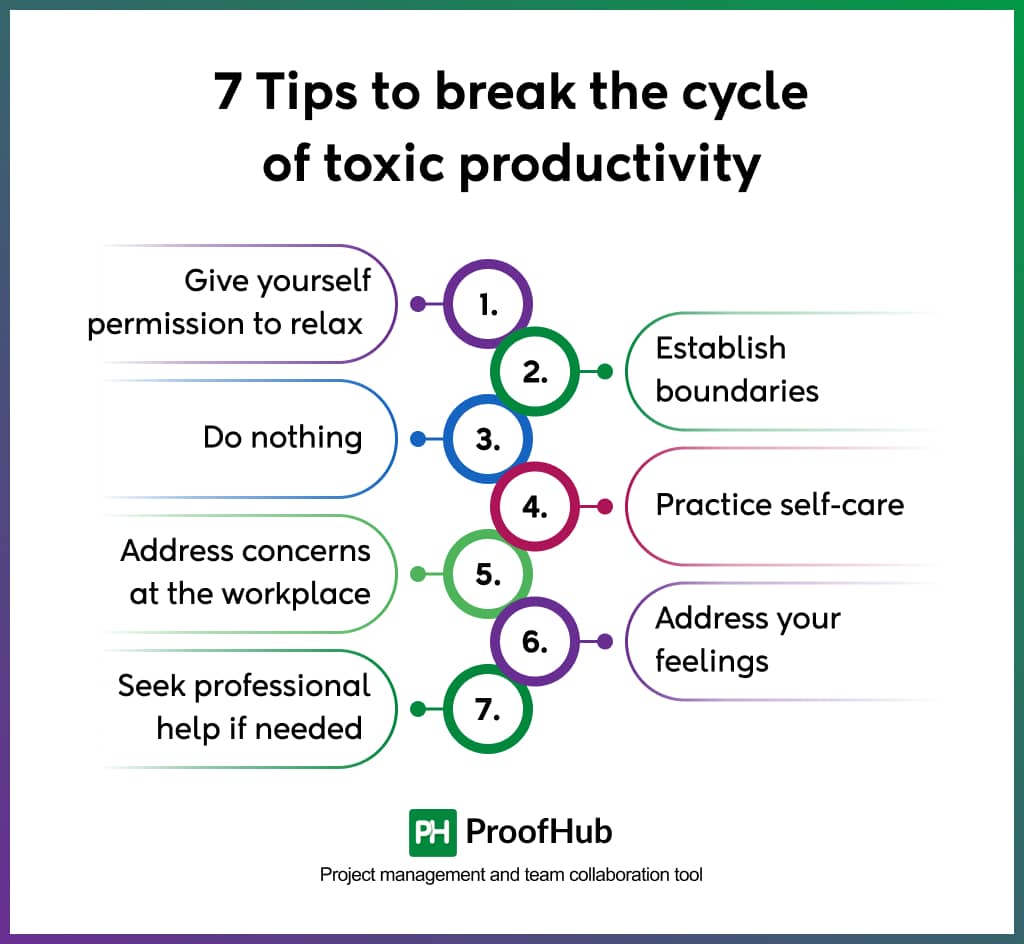
Here are the seven tips that help you break the cycle of toxic productivity:
1. Give yourself permission to relax
The first thing first— to permit yourself to relax. You have to make conscious statements to yourself like these from time to time:
“I am allowed to rest and take care of myself.”
“My work is only a little aspect of my life.”
“I am worth more than my work.”
Reminding yourself of these helps you relax and lays the foundation to break the cycle of toxic productivity.
2. Establish boundaries between work life and personal life
The most noticeable symptom of toxic productivity is overworking.
Set concrete boundaries between your work life and personal life. Especially, if you are working from home, the boundaries between your personal and professional life would be blurred.
Set strict working hours and try to complete all of your tasks in these. Make sure your office email ID is not logged into your phone. This is to ensure that you are not checking the notifications related to work while you are having dinner with your family or playing with friends.
Do you feel that you do not have enough time to complete tasks during working hours?
Digital tools can help you achieve more in less time. It helps you effectively set boundaries.
Check out the best work management software for a more productive workplace in 2025!
3. Do nothing
Once you have convinced your mind to relax and establish strict boundaries, start doing activities without the lust of extracting something out of it.
This is the biggest problem with people with a toxic productivity mindset. Instead of going for a walk for the sake of relaxing, they want to go for a walk with the purpose of self-improvement. When they read a book or watch a movie, they do it with the motive to learn something; not to enjoy it.
Avoid this. Just simply be. Relax in this free time. Do any activity you want to do without attaching a purpose to it.
4. Practice self-care
The most harmful impact of toxic productivity is on your mental and physical health. It is because it makes us not value taking care of ourselves.
It is time to set the basics right again. Decide the amount of time you want to invest in practicing self-care. There is no one magical number for everyone, but you can start small by giving one hour daily to self-care.
The activities for self-care can be exercise, meditation, cycling, going to a gym, a bike ride, or a hike. It will help you improve your mental and physical health.
5. Address concerns at the workplace
If you become toxically productive due to the work environment, it is time to politely confront it with empathy.
For example, if you have not been taking your paid leaves or you are taking client calls on weekends, tell your manager that you cannot work like this anymore.
You need work-life balance in your life. Tell your manager how it is affecting your personal life and work quality. You can also suggest ways that can help promote work-life balance.
If your organization does not value it, it would be sensible to look for a workplace where people come first over money.
6. Address your feelings
If you always feel the need to be doing something and being busy, it is a sign of unresolved trauma, lack of love, or self-worth issues. It is very important to introspect, accept, and address your feelings because escaping from them has not reaped fruitful results.
Be kind to yourself. Know you are worthy. Socialize with the people who make you feel that you belong in this world. Make friends that accept you for the being you are.
7. Seek professional help if needed
Sometimes, it is hard to break the cycle of toxic productivity on your own. And unfortunately, people close to you have contributed to that.
In that scenario, it is okay to seek the help of a professional therapist. It is because a professional knows the why of it and how to solve it. They can provide you with personalized guidance to help you with it.
I hope these tips help you in the journey of healing from toxic productivity.
Role of leadership in managing toxic productivity
Leadership plays a crucial role in managing toxic productivity, which can gradually infiltrate workplaces. If your team members feel pressured to always be “on,” constantly racing against deadlines, they will become victims of heightened stress and burnout.
As a manager, you can shift this narrative. Create an open and transparent environment for your team members where they feel comfortable discussing their workloads and any challenges they face. Regularly check in with them to assess stress levels and adjust expectations accordingly.
Also, set realistic goals, so that your team can focus on quality rather than sheer output. When you demonstrate a balanced approach to work, your team is more likely to adopt similar habits.
Celebrate achievements but also encourage breaks when needed. By promoting healthy work habits and prioritizing well-being, you can cultivate a workplace where productivity flourishes without toxic pressures.
However, you need to always keep in mind that a happy team is not just productive, it is engaged and motivated to excel! Your leadership skills can change your work culture into one where everyone has the opportunity to thrive.
Final words: working to live, not living to work
Toxic productivity is harmful to health. Initially, it may feel like it is giving you a return. But in the long run, it is detrimental to mental health, emotional stability, physical health, relationships, and your ability to deliver quality work.
It is because your body needs rest, your mind needs to relax, and your soul needs time for rejuvenation. Depriving yourself of these things means going against nature and the result will be you are not happy.
And if you see why you initially accept toxic productivity, it is because you want to be happy. So, it is very important you gradually work on it, find the right balance, and live a happy life.
FAQs
What is the toxic productivity trend?
Toxic productivity is the compulsive need to be productive all the time. This has become a trend because it receives support from society. It helps you grow but the growth comes at the expense of health, relationship, and well-being.
Why is hustle culture toxic?
Hustle culture is toxic because it values productivity, wealth, achievement, and going hard more than human internal well-being. It does not value self-care. Above all, it makes you feel guilty for that, which eventually leads to burnout.
Would you need professional help to break the cycle of toxic productivity?
If toxic productivity has led to long-term unhappiness, depression, and frequent burnout, you may need the help of a professional to break the cycle of it. Sometimes the cause of it lies in the deeper issues. It is hard to get out of it on your own.
